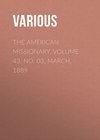Buch lesen: «Mrs. Whittelsey's Magazine for Mothers and Daughters», Seite 8
SALEM, MICHIGAN
We have been brought, through the kindness of our Heavenly Father, to this the first anniversary of our Maternal Association. We meet to-day that we may together look back upon the year just closing, and recall the mercies and judgments of our God, in which I think we cannot fail to recognize the guiding hand of our Heavenly Father, who we believe has presided over and defended the dearest interests of this our little society. We bless his name that a few individuals, sustaining the sacred name of mother, and upon whom consequently devolve important duties, were led to roll their burden, in all its magnitude, upon an Almighty arm, and in a united capacity to plead for promised grace. We rejoice that this feeling has been perpetuated, and that there have been those who have not "forsaken the assembling of themselves together," but who have been drawn to the place of prayer by an irresistible influence, esteeming it a privilege thus to resign their numerous anxieties into the hands of an all-wise God. And may we not rejoice, dear sisters, that as each returning fortnight has brought its precious opportunity for prayer and instruction, our hearts have cheerfully responded to its call, and that we have hailed these seasons as acknowledged and well-tested sources of profit. If they have not proved so to us, have we not reason to fear that our guilt will be greatly increased, and that we shall share the condemnation of those who have been frequently and faithfully reminded of duty, but who have failed in its performance? During the past year we have had twenty-two meetings, the most of which have been attended by from six to ten mothers. A small number, indeed; yet God, we remembered, promised that where two or three are met together in His name, He would be in their midst to bless them. On the 7th of May the Rev. Mr. Harris preached to the children, from the text, "Suffer little children to come unto me, and forbid them not." Sixteen ladies were present, and twenty-three children. On the 28th of September, Professor Agnew addressed mothers on their various important duties. At the commencement of the year we numbered twelve mothers and twenty-three children, under the age of fifteen. We now number sixteen mothers and thirty-three children; one little one has been added to our number. God, in wise providence, and for some wise purpose, has seen fit to lay his afflicting hand upon us. Early in the year it pleased Him to call an aged and beloved father of one of our sisters from time to eternity. With our sister we do most sincerely sympathize; may it truly be said of us, as an Association:
"We share each other's joys,
Each other's burdens bear,
And often for each other flows
The sympathizing tear."
But God has come nearer still unto us as an Association, and has taken one of our little number, dear sister Elizabeth C. Hamilton, who was one of the four mothers who met together to converse and to ask counsel of our pastor on the subject of forming this Association. On the 11th of October, her spirit took its flight from this frail tenement of clay, as we humbly trust to the mansions of the blest. With her bereaved and afflicted companion and infant daughters, we do most sincerely sympathize. May we remember that we have promised to seek the spiritual and eternal interests of her children as we do that of our own! Let us not cease to pray for her children until we shall hear them lisping forth the praises of the dear Redeemer. As we commence a new year, shall we not commence anew to live for God? Ere another year has gone, some one of this our little number may be called from time to eternity; and shall we not prove what prayer can do; what heavenly blessings it will bring down upon our offspring? But perhaps some mother will say, I should esteem it the dearest of all privileges, if I could lay hold in faith on God's blessed promises, but when I would do so a sense of my own unworthiness shuts my mouth. But which of God's promises was ever made to the worthy recipient? Are they not all to the unworthy and undeserving? And if "Satan trembles when he sees the weakest saint upon his knees," shall we not take courage, and claim God's blessed promises for ours, and often in silence and in solitude bend the knee for those we love most dear?
While memory lasts I shall never forget my mother's earnest, supplicating, trembling voice, as she pleaded with God for Christ's sake to have mercy on her children. And shall our children forget ours? No, dear sisters, let our entreaties with our God be as they will, I think they will not be forgotten. Therefore, let us be more awake to this subject, let us sincerely endeavor to train our children up for God, that they may be useful in his service while they live, and that we may be that happy band of mothers that may be able to say in God's great day: Here, Lord, are we, and the children which thou hast given us.
A. Hamilton, Secretary.Salem, Wash. Co., Michigan, Dec. 31, 1851.
Original
BROTHERLY LOVE
BY REV. MANCIUS S. HUTTON, D.D
"Be kindly affectioned one to another, with brotherly love, in honor preferring one another."
In no system of morals or religion, except the Bible, can such a precept be found. It at once proclaims its divine author. We feel as we read it—here speaks that God and Almighty Father who so loved the world as to give his Son to die to save it. We feel that none but a being who regards himself as the Father of all, and who would unite his children in the bonds of family affection, would think of urging upon a company of men and women, gathered from all classes and conditions of life, the duly regarding each other with the same sincerity, tenderness, respect and kindness as if they were the nearest relatives. Such is the force of the expression, "Be kindly affectioned one to another." The word expresses properly the strong natural affection between parents and children; but the apostle is not satisfied with this, and uses the word to qualify that brotherly love which our Lord has made the badge of discipleship. It should be with the tenderness and the unselfishness which characterize the filial and paternal relation, blending love with natural affection, and making it manifest in common intercourse. Oh, how different this from the spirit of the world, the spirit which seeks not to bless others, but self; not to confer honor but to obtain it; which aims not to diffuse respect, but to attract all others to give honor to ourselves.
I design at present to use this divine injunction as conveying the Holy Spirit's direction and description of proper family intercourse, in reference, particularly, to children in the family circle.
I notice very briefly (for the direction must commend itself to the heart of every child) its application to parents: "Be kindly affectioned toward your father and mother." It is indeed hardly necessary to urge this duty, for God has in his wisdom so constituted us, as in a good degree to insure the duty of filial love even in those who do not regard his own authority over their spirits. No child can for a moment reflect upon the love and care which he has received from his parents, without a moved heart, although he can never know their full power until he himself becomes a parent; but here indeed lies the difficulty, and here do I find the necessity of dwelling for a moment upon this point. Children do not reflect upon this. Few ever sit down, calmly and consecutively, to recall the parental kindness, and therefore, would I ask each of you, my young friends, that you may obey this injunction, and be kindly affectionate towards father and mother, to consider their kindness to you. Why, if you look at it, you will hardly be able to find that they have any other care in the world, or any other object, than yourselves. What does that kind mother of yours do which is not for her children? does she not seem always to be thinking of you? have you never noticed how her eye brightens with delight when you or any of your brothers or sisters do right, or even when she looks around on the health and happiness of her children? and, when you or any of her dear ones are ill, how sad she looks, how her cheek will become pale, and how she will watch and wait at the bed-side of her child, how her own hand gives the medicine, how nothing can call her away from home, no friends, no amusements, often not even the church and Sabbath-day, and if she did go to church while you were ill, she went there to pray that God would make you well. And I would have you also think of the large surrenders of ease, time and fortune which your father is daily making for the benefit and comfort of his children. How many fathers will compass land and sea in quest of provision for them, and in order to give them name and station in society? How many adventurously plow the ocean in their behalf? How many live for years in exile, and in the estrangement of a foreign land, with nothing to soothe them in the midst of their toil and fatigue, but the image of their dear and distant home? How many toil and plan, day after day, and year after year, from early morn until late at night, for no other object than to gather wealth, which in their love they expect and intend their children to enjoy, when they themselves have gone down to the grave! Oh, my young friends, though ye have not perhaps thought of it, yet the devotedness of a parent to his children, in the common every-day duties and comforts of life, often equals and surpasses that which history has recorded for us of the sublimest heroism.
It would often seem utterly impossible to wear out a father's affection or a mother's love, and many a child, after the perversities and losses of a misdirected manhood, has found himself welcomed back again to the paternal home, with all the unquenched and unextinguishable kindness of his early and dependent childhood; welcomed even amid the hardships of poverty, with which declining years and his own hand, perhaps, have united to surround the whitening heads of the authors of his being.
Now, it is in view of the reality and strength of these parental regards, thus flowing from a father's or a mother's heart upon their children, that we bid you see the force, the reason, and the right of the direction, Be kindly affectionate in all your intercourse with them. And it is in the same view that we appeal to your own hearts, and ask whether it be not most revolting and wrong for a son or daughter to utter the word, or dart the look, or feel the feeling which is prompted by wickedness; a disdainful son or disrespectful daughter is a sight most painful to every right-minded man.
But while I mention this as the rule which should govern the family in their treatment of those who stand at its head, I would also beg leave to remark, that this same law should govern the heads of the family towards each other and all the members. This is the only way by which reciprocal affectionate regard and treatment can be inculcated and insured. The Holy Spirit has deemed this so important, that He has given the express injunction to parents: "Fathers, provoke not your children;" and it is an injunction which parents need constantly to remember. The natural and necessary subjection of the children to parental authority, unless the hearts of the parents be guided by religious principle, will often induce an arbitrary and enforced obedience, which, unless guided and controlled by affection, will have only the appearance of harshness, and will only produce unpleasant feeling. Parents should never forget that it is always as unpleasant to a child to have his will and plans crossed as it is to themselves, and that, therefore, it is their own obedience to the injunction, Be kindly affectioned, which alone can make their authority both strong and pleasant. There are again so many cares and anxieties connected with the details of family arrangements, and there are so much thoughtlessness and perversity in the depraved hearts of the most amiable and properly disposed children, that the patience of even the all-enduring mother will often be tried in a manner which nothing but divine grace can sustain. Ill health and natural irritability, so constantly exposed to attack, will often increase the difficulty, and thus make the injunction, Be kindly affectioned, one of the most arduous duties of life. But the triumph of principle will always be accompanied with corresponding valuable results in the happiness and comforts of the whole family circle.
Original
KNOW THYSELF
Many instructive lessons may be conveyed to the minds of children in story and in verse. We do not now remember who is the author of the story we are about to relate. It may be familiar to many of our readers. We venture, however, to repeat it in our own words, as it has an important moral worthy the attention of the old as well as the young:—
A man and his wife were hard at work in a forest, cutting down trees. The trees were very hardy and tall, and their axes were dull; the weather was cold and dreary, they were but poorly clad, and they had but little to eat.
At length, the woman, in her despondency, fell to crying. Her husband very kindly inquired, "What is the matter, my dear wife?"
"I have been thinking," said she, "of our hard fate, and it does seem to me a hard case that God should curse the ground for Adam's sake, just because he and his wife had eaten a green apple; and now all their descendants must earn their bread by the sweat of their brow, all their days."
The man replied, "Do not, my dear wife, distress yourself thus, seeing it will do no good."
She continued, "I do think that Adam and Eve were very foolish to listen to any thing that a serpent had to say. If I had been in the place of Eve I am sure I should have done otherwise."
To this her husband replied, "True, my dear wife, Eve was a very silly woman. I think, if I had been in Adam's place, before I would have listened to her foolish advice, and run such a hazard, I would have given her a smart box on the ear, and told her to hold her tongue, and to mind her own business."
This remark made his wife very angry, and here followed a long dialogue on this topic till they began mutually to criminate each other as well as the serpent.
Now, a gentleman, who had all this time been concealed behind the trees, and had heard their complaints, and listened with grief to their fault-finding disposition, came forward and spoke to them very kindly.
He said, "My friends, you seem to be hard at work, and very unhappy. Pray tell me the cause of your misery, and whether I can do anything to comfort you?"
So they repeated to this gentleman what they had been saying.
He replied to them thus: "Now, my dear friends, I am truly sorry for you, and I desire to make you more comfortable. I have a large estate, and I wish to make others as happy as I am myself. I have a fine house, plenty of servants, and every thing desirable to eat and to drink. I have fine grounds, filled with shrubbery and fruit trees. If you will go and live with me you have only to obey the regulations of my house, and as long as you do this and are contented, you shall be made welcome."
So they went with this gentleman. At once he took off their rough and ragged garments, and clad them in a fine suit of clothes, suited to the place, and put them into a spacious apartment, where for a time they lived very happily.
One day this gentleman came to them, and said business of importance would call him from home for some days. In the mean time he hoped they would be happy and do every thing in their power to reflect honor upon his hospitality till his return. He said he had but one other suggestion to make, and that was, that for his sake they would be very careful to set a good example before his servants, and do every thing cheerfully that they should direct, for up to this hour not one of his servants had ever questioned the reasonableness of his commands.
They thanked him kindly for his generous supply of all their wants, and promised implicit obedience.
They now had, if possible, more sumptuous meals, and in greater variety than ever, and for a few days every thing went on well. At length, a servant placed a covered dish in the center of the table, remarking that he always had orders from his master, when that particular dish was placed upon the table, that no one, on pain of his displeasure, should touch it, much less lift the cover.
For a few days these guests were so occupied in examining the new dishes that this order was obeyed.
But the woman at length began to wonder why that dish should be placed on the table if it were not to be touched; she did not for her part see any use in it.
Every meal she grew more and more discontented. She appealed to her husband if he did not think such a prohibition very unreasonable. If it were not to be touched, why was it placed on the table?
Her husband at length grew very angry; she would neither eat herself nor allow him to eat in peace. She at length remonstrated, she threatened; she used various arguments to induce him to lift the cover; said no one need to know it, &c. Still her good-natured husband tried to reason her out of this notion. She now burst into tears, and said her life was miserable by this gentleman's singular prohibition, which could do no one any good; and she was still more wretched by reason of her husband's unkindness,—she really believed that he had lost all affection for her.
This remark made her husband feel very badly. He lifted the cover and out ran a little harmless mouse. They both ran after it, and tried their best to catch it, but in vain.
While they were feeling very unhappy, and were trembling with fear, the gentleman entered, and seeing their great embarrassment, inquired if they had dared to lift the cover?
The woman replied that she did not see what harm there could be in doing so. She did not think it kind to place such a temptation before them; it could do no one any good.
The man added that his wife teazed him so that he had no peace, and rather than see her unhappy he had lifted the cover.
The gentleman then reminded them of their fault-finding while in the forest, their hard thoughts of God, of the serpent, and of Adam and Eve. Had it been their case they should have acted more wisely! But, alas! they did not know themselves!
He immediately ordered his servants to take off their nice new clothes and to put on their old garments, and he sent them back to the forest, ever after to eat their bread by the sweat of their brow.
Original
OLD JUDA
Many years since, I took into my service an old colored woman by the name of Juda. She was a poor, pitiful object, almost worn out by hard and long service. But I needed just such services as she could render, and intrusted to her the general supervision of my kitchen department.
Under the care bestowed upon her she fast recruited, and I continued to employ her for three years. I gave her good wages, and, as for years I had induced all my help to do, I persuaded her to deposit in the savings' bank all the money she could spare. Fortunately for poor old Juda, she laid up during these three years a considerable sum.
Before this, she had always been improvident, careless of her earnings, and from a disposition to change often out of place. But as one extreme is apt to follow another, when she found that she had several dollars laid aside, entirely a new thing for her, there was quite a revolution in her feelings and character. She now inclined to covetousness, and could hardly be persuaded to expend a sum sufficient to make herself comfortable in extreme cold weather which sensibly affected her in her old age and feeble health. At length her disposition to hoard up her earnings increased to that degree that she resorted to many unnecessary and imprudent means to avoid expense and to evade my requirements with regard to her apparel. But for this parsimony she might have held out some years longer. She greatly improved in health and strength for the first two years, and was more comfortable and useful than I expected she would be. Always at her post, patient, faithful, economical and obliging, I really felt grateful for the relief she afforded me in the management of a large family; but at length I was obliged to dismiss her from my service. For a few months she found employment in a small family, but soon fell sick, and required the services of a physician. She had to find a place of retirement and take to her bed, and soon her money began to disappear.
Her miserable sister, who had exercised an injurious influence over Juda, and whom I had found it necessary to forbid coming to my house, now came constantly to me for this money, for Juda's use, it is true, but which I had reason to fear was not wisely spent. Under this impression, I broke away from my cares and set out to look after her welfare. I was pained to find her in a miserable hovel, surrounded by a crew of selfish, ignorant, lazy and degraded women, who were ready to filch the last farthing from the poor, helpless invalid.
My first interview with Juda was extremely painful. She hid her head, her great wall eyes rolling fearfully, and cried bitterly, "Oh! I am forever undone. Why did I not listen to your entreaties, and heed the kind advice of my good master, to lay up treasures in heaven as well as in the savings' bank!" I remained silent by her bedside, thinking it better for her to give full vent to her agonized feelings before I should probe her wounded spirit, or try to console her. "Oh," said she, "that I could once more have health, that I might attend to what ought to have been the business of my life—the care of my soul." "Yes, Juda," I replied, "but I see, I think, plainly, how it would be had you ever so much time. You would not be very likely to improve it aright, for even now you are wasting this last fragment of time that remains to you in fruitless regrets; why not rather inquire earnestly, 'Is there still any hope for me? What shall I do to be saved? Lord, save me, or I perish.'" For some time her emotions choked her utterance, at length she seized both my hands so forcibly that it seemed as if she would sever them from my wrists, and exclaimed, "Oh, pray for me!"
Her condition was an awful one. From the nature of her ailment she was a loathsome object. Not one of her old companions would approach her, for to them she was now peculiarly an object of terror. Her entreaties that I would not leave her in the power of such cruel wretches, to perish alone, and without hope, prevailed over my own reluctance and the remonstrances of my husband, and summoning up all my resolution, I remained with her, with but little respite, for three days and nights.
Her bodily sufferings continued to be extreme to the last, but were nothing in comparison to her mental agonies. What a condition of mind and body was hers! Every moment demanding something to cool her parched tongue, or to allay her fears, or to encourage her hopes.
Never shall I forget the last night of painful and protracted suffering. The miserable woman who pretended to assist me in watching, had taken some stupefying potion, and I watched alone, as David expressed it, longing for the first ray of the morning. At length, the day dawned, and I was relieved by good old Mr. Moore. As he entered, I said to him, "Poor Juda is still living, and is a great sufferer; will you not pray for her?" He replied, "I come purpose pray with Juda." Then kneeling, prayed, "Oh Lord, Oh Lord God Almighty, we come to thee for this poor dying creature. Have mercy on her precious soul—Lord God, it will never die. Forgive her sins; oh, Lord God, take the lead of her thoughts to-day, TO-DAY, TO-DAY; Lord God, take the lead of her thoughts to-day, for Christ's sake. Amen."
This was indeed her dying day, and I could not but hope that this humble but pertinent prayer was prevalent with God.
Very many times since then, as I have caught the first glimpse of day, have I said, This may prove my dying day, and prayed, Oh Lord, take the lead of my thoughts to-day.




















